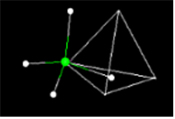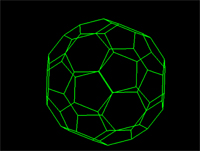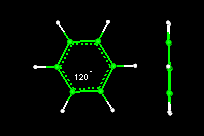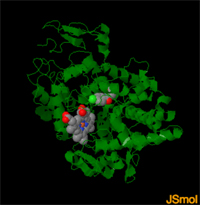What is the geometry of benzene?The chemical compound benzene (C6H6) is a colorless, flammable, aromatic hydrocarbon, that is a known carcinogen. It boils at 80.1°C and melts at 5.5°C. Benzene has a heat of vaporization of 44.3 kJ/mol and a heat of fusion of 9.84 kJ/mol. Produced by hydrogen reduction of some allotropes of carbon, or from petroleum, it is used in the creation of drugs, plastics, gasoline, synthetic rubber, napalm and dyes. The benzene molecule is composed of six carbon atoms joined in a ring with one hydrogen atom attached to each. As it contains only carbon and hydrogen atoms, benzene is classed as a hydrocarbon. X-ray diffraction shows that all six carbon-carbon bonds in benzene are of the same length, at 1.4A. You can check this measurement below using Jsmol. The C–C bond lengths are greater than a double bond (1.35 A) but shorter than a single bond (1.47 A). This intermediate distance is consistent with electron delocalization: the electrons for C–C bonding are distributed equally between each of the six carbon atoms. Benzene has 6 hydrogen atoms – fewer than the corresponding parent alkane, hexane. The molecule is in a flat or planar hexagon ring. The molecular orbital description involves the formation of three delocalized π orbitals spanning all six carbon atoms, while the valence bond description involves a superposition of resonance structures. It is likely that this stability contributes to the peculiar molecular and chemical properties known as aromaticity. To accurately reflect the nature of the bonding, benzene is often depicted with a circle inside a hexagonal arrangement of carbon atoms. See benzene molecule for complete description. -------------->spin on -------->- spin off ------>space fill/cpk -------->stick ----> ball-and-stick ----> methane Measure the angles formed in benzene. First click on spin off.
-------------->spin on -------->- spin off ------>space fill/cpk -------->stick ----> ball-and-stick Cyclohexane, is also a six carbon ring structure but instead contains all single bonds and is not a flat ring. The ring formation of cyclohexane attempts to attain the bond angles for the tetrahedral carbon atoms. Measure angles in benzene --- submit for tetrahedral structure...
Assessment -- Try these questions--1) What is the measurement for any of the H-C-H angle to the closest tenth degree? Please enter your answer in the space provided: 2) What is the measure of the C-H bond in methane? 3)How many faces does a tetrahedron have?
|
MATHMOL

- Activity 1: Measuring length and distance at the molecular level
- Activity 2: Geometry-of-1-Dimension
- Activity 3: Geometry of 2- Dimensions
- Activity 4: Geometry of 3-Dimensions
- Activity 5: Introduction to Molecular Modeling using Jsmol
- Activity 6: The Geometry of Crystals
- Activity 7: Summary Sheet by Students
- Activity 8: What is the Geometry of the Methane Molecule
- Activity 9: Geometry of the Crystal Structure of Ice
- Activity10:Geometry of the Benzene Molecule




